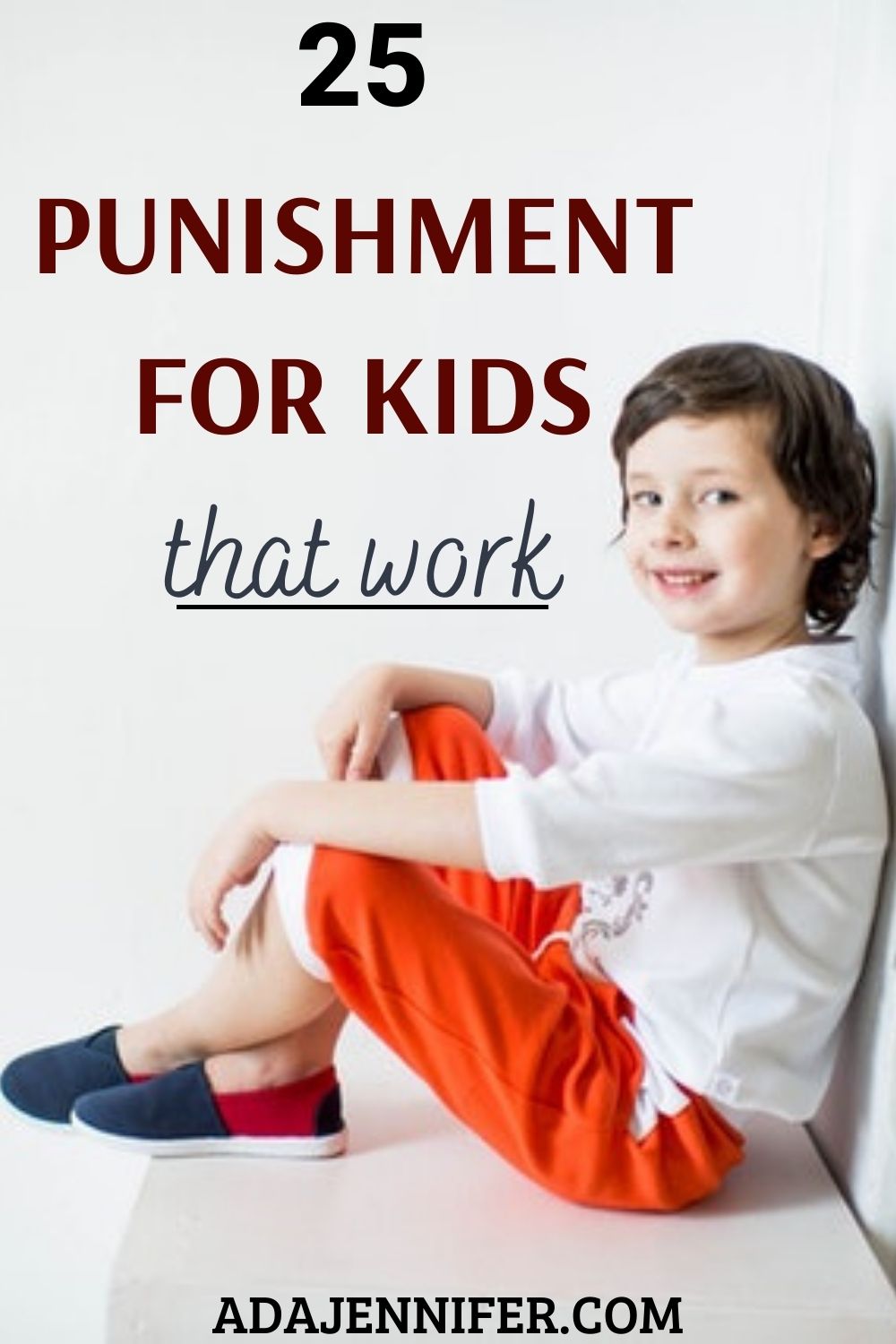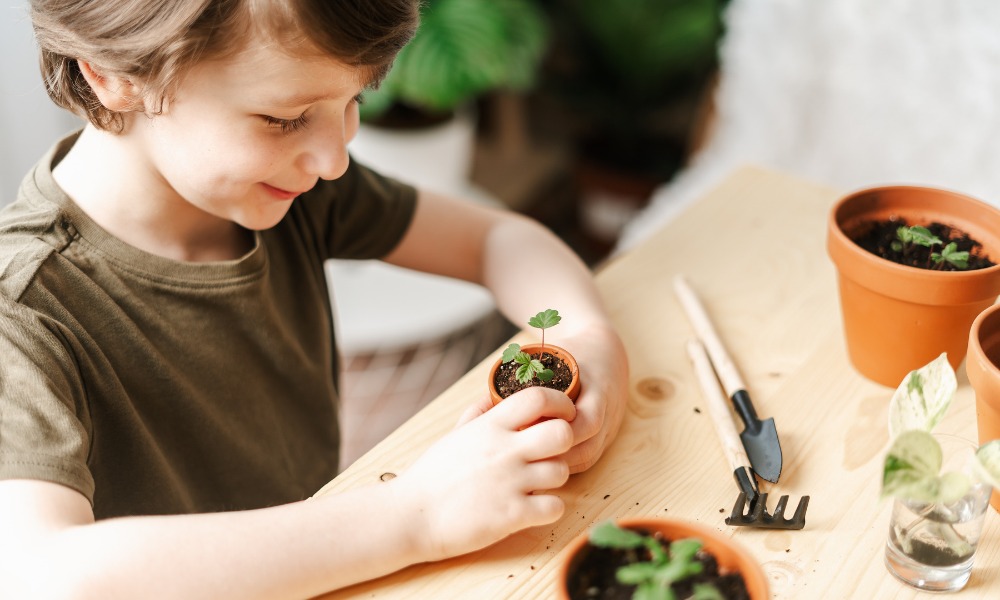Punishment For Kids: 25 Punishments That Work

When a child misbehaves, parents majorly focus on reprimanding their children. They focus their energy on punishing their child either by yelling or beating.
Kids will never understand why you yelled at them at such a tender age. Even if they do, violent/strict parenting will affect your child’s growth & mental health negatively.
It can give birth to multiple personality disorders in your child, such as lack of confidence, low self-esteem, aggressive behavior, learning violent ways to get things done, choosing violence, etc. That is why it is important for parents to learn innovative punishment for kids that work and avoid the use of violence.
If parents recognize the root of their child’s behavior, they can not only understand them better but also come up with better ways of punishment that exclude beating, spanking, and yelling.
Often, the child is deprived of attention, so to fill that deprivation, they misbehave. While the attention and punishment they receive are negative, it still satisfies their need. This is why proper, more innovative ways of punishing must be taken up.
Hitting and spanking fail to teach your child any alternative to their undesired behavior. It only accomplishes the task of silencing them or stopping their misconduct. Teaching your child a lesson should always be done
- By keeping the potential long-term effects in mind.
- And never in a rash state of rage that may lead to various accidents and possible trauma.
Okay, truth be told, kids do love to misbehave. It’s normal, even suitable for their personality, as long as it’s playful and doesn’t harm others.
However, if your kid doesn’t listen despite making them understand a thousand times, it’s time that you try the right punishment for kids and punish them appropriately.
Punishing them in a way that’s not only positive but also productive.
Keeping all these things in mind, here are some innovative ideas when it comes to punishment for kids:

1. Time ins
We have all heard about the ‘time out’ method where children are sent to a room’s corner to be quiet and alone. In these timeouts,
- the child keeps fidgeting,
- stays angry or upset,
- Doesn’t understand why they are not allowed to talk.
- The child doesn’t receive attention, affection, or love. Which is quite literally sad for anyone, let alone a young kid.
However, with time-ins, you are meant to give your child a task to complete, such as reciting their alphabets, practicing basic math equations, unpuzzling their leftover puzzle, singing, etc.
For a child that’s a little older, maybe something like reciting the periodic table may be more appropriate. With time-ins, you not only discipline your child but also diffuse their upset emotions and have them get better at memorizing and learning all at the same time.
2. Marble Jar

In this method, you could keep an open jar on the dining table or on the kitchen counter, somewhere it’s easily accessible. When the child misbehaves, you can add marbles into the pot.
Decide a threshold and punishments for when your child crosses that leverage. For example, if you have two or more children crossing the threshold, cease their favorite video games or take away their favorite chocolate.
Tell them, “You can only have your video game back when you apologize (to their siblings/parents) for your mistakes.”
Have 4-5 thresholds in a single jar, mark them up with a permanent marker, and decide a punishment for every level. As the pot fills up, their privileges must be taken away.
The more full it gets, the more severe the loss of privilege. Say the first quarter of the jar gets filled up, then take away something simple, like their ‘TV watching time.’ However, if that jar reaches its brim— take away their outdoor time until and unless they understand the severity of their actions.
3. Cool Off time— Give them space
After an intense disagreement or fight between you and your child/sibling-sibling— proceed for cool off time.
Kids may not understand when they are angry, so give them time to cool off that heat. Allow them to walk in the park and play with their friends, pets, or toys. This will set their mind to purposely calm it down.
Once they have relaxed, you can sit them down and explain why & what they did was wrong and what they should do to fix it. During this process, don’t forget to listen to what your kids have to say.
4. Give Chores
This is a very effective punishment for kids. When your child misbehaves, give them household chores. It can include:
- Cleaning the mess.
- Mopping the floor,
- cleaning windows,
- mowing the lawn, etc.
Add music to their cleaning session so that they can enjoy themselves while completing punishments.
5. A Bowl Of Self-decided Punishment
Sit with your kids and ask them to develop creative punishments. Make them write it down on colorful chits and slip it inside a jar.
A bowl of punishment will make everything more fun, and your kids will actually anticipate the suspense of punishment.
6. Get Crafty

Well, why make your kids stand in a corner doing nothing when you can let them be crafty? You can better utilize punishment hours into an artistic session— where your kids can design apology cards, paintings, drawings, etc.
7. Creating New Hobbies— A New Variation To Punishment
When your child misbehaves— propose to them a new hobby.
- Parents can come up with a set of hobbies,
- Ask their children to come up with new hobbies,
- Or, create a bowl of ideas together that can be picked later and continued.
Hobbies can include:
- Arts (as mentioned above)
- Writing journals.
- Learning a new musical instrument
- dance classes by themselves in a room.
- Running,
- Singing,
- Solving puzzles
- Creating stories
- storytelling and so much more!
The ideas are limitless, and your kids will learn something interesting every time.
8. No treats
Suppose your child refuses to eat their vegetables. In that case, you can deny them permission to have treats— No chocolate, ice cream, or candy. Unless and until they finish their plate of food, they’re not allowed to have any kind of treats.
On the other hand, you can reward them with goodies for being good while eating. This kind of punishment for kids can reduce a child’s tendency to be picky or eat less, and will in turn lead to better health for this child in the future.
9. Exercise
A simple disciplinary measure or punishment for kids would be to tell them to do an exercise every time they misbehave. Every time they get out of line, ask them to give you 10 jumping jacks or 10 sit-ups.
This sort of discipline will not only teach your kid a lesson but also make them stronger in the long run. The only thing to be wary about is not to overdo it because if this method is used too often, your child could get tired out.
Overdoing exercise will make your kids lose all their energy to perform other essential tasks.
10. Volunteer Outside Tasks
This can include everything—
- volunteering in the society’s cleaning community,
- helping a friend with studies/work,
- visiting orphanage/old house and enabling manually,
- Taking care of animals in any rescue camp.
11. Make them earn their share of pocket money
Despite all the positive parenting, kids will behave ridiculously at times. When they do, cut off their pocket money and ask them to earn their own. Of course, guide them through the process.
- They can sell good cookies in the neighborhood or amongst their friends at reasonable prices.
- Polish shoes to earn extra money.
- You can negotiate chores as well in these earning policies.
It works like magic to kids. Make sure your kids’ earnings exceed their pocket money to keep them motivated.
12. Give them attention. Punishment— talk

As talked about earlier, the reason kids misbehave is because they need parental attention. So a progressive method to correct your child’s behavior would be to give them proper attention.
Sit down with your kids and ask them how their day went. Hold them, embrace them, ask and listen intently about all the details in the topic.
- Hear them out and tell them things you were proud of them for.
- Tell them that you’re glad when they’re happy or upset when they’re sad. This will really make them feel heard and understood.
A key thing in having a good relationship with your child is becoming equals. Of course, you have more authority over them. But when listening to them, always try to bring yourself down to their level and put yourself in their shoes.
Using too much authority can very much feel controlling & suffocating to the child. When a child is put in a cage, they’ll most certainly misbehave and act out.
Keeping all these things in mind, giving your children attention is a great way to keep them happy and avoid misbehavior in the future.
13. Appropriate ignorance— Avoid overparenting
Learn to ignore minor behaviors such as swinging legs or tapping on the table. Humans in general and kids especially are very fidgety beings.
They like to move around and keep their hands or legs engaged in one way or the other. While these acts may get annoying sometimes, let it be and learn to ignore them. As mentioned previously, being too controlling can adversely affect how the child feels about their freedom. Swinging their legs, tapping their feet, or tapping their thighs isn’t harmful.
It isn’t harming them or anyone else, so you don’t need to tell them to stop. Sometimes shuffling or moving some parts of the body is relaxing, keeping them occupied.
If it’s negatively affecting people’s personal space or the silence in a quiet place, politely tell them how it’s disturbing other individuals present in the room.
14. Never ask more than twice— Understanding goes a long way!
When your child doesn’t listen to you, it’s common for parents to yell or scold them until they do, which is too extreme and entirely unnecessary. The child will listen to you but only with bitterness. So a calmer, more consequential approach is appropriate.
- For starters, understand why they are not listening to you. They might be engaged deeply in the cartoon or playing intently to not hear you.
- Second, kids won’t learn overnight. It’s a process that you will need to adhere to for a long time.
- Teach your kids good behavior and bad behavior outcomes. Tell them the merits of good behavior and the demerits of bad behavior.
- Reward them for every good behavior they practice.
- However, if you have not practiced it from the start, you should start now!
- Make sure you are demanding valid behavior from your kids.
- Explain why there are ‘TV hours’, ‘Playing hours’ or ‘Mobile hours.’
- Talk to them in keeping yourself in their show, not the other way around.
- Try love and understanding while teaching your kids manners rather than anger and dominance.
15. Don’t be forceful— Instead of snatching away when they are wrong, give when they are good!

As said before, being controlling can be very detrimental in the relationship with your child. Learn to be more lenient and negotiable. Let’s say your kid wants to increase their outside playtime by half an hour. Instead of telling them, “Follow what I say, or nothing at all,” allow more flexibility.
Tell the reasons why you think what you think. And if they’re really not willing to budge, give them expectations such as “You can have the extra 30 minutes, as long as you practice good behavior, kindness, gentleness, and understanding.”
This method is highly effective for both parties. They get their extra fun; you get your kids to behave. This way, not only will you be satisfied, but the kids will try harder to gain merits.
Also, they will work more, hoping that they can get more privileges in the future. This can work the other way around as well; when the child knows that they get extra things if they’re good, they will be willing to do more.
They could maybe come up to you and say, “If I get my grades up to an A+, can I get a new phone?” This method encourages an effort and reward system because the better they perform, the more freedom they get.
16. Give them chances— Focus on teaching rather than beating
When your child misbehaves severely sometimes, give them the chance to redeem themselves. Doing this is really beneficial.
For example, let’s say your child has failed a significant exam. More often than not, parents will seriously reprimand their children due to their grades.
This puts insane pressure on their heads and makes them feel burdened. Schoolwork is burdening already, but then the stress from the parents only adds to that. When something like this happens, give your child another chance. Sit down with them, give them a hug and tell them it’s okay. Because believe it or not, children also feel bad when they fail.
Love, appreciation, and respect can heal and do wonder to your kids
The most essential things while parenting are reassurance and belief. You need to hold your child, no matter their age, and tell them that it’s alright. Just these words alone are enough to give them a sense of hope. When kids fail at times, they genuinely feel bad and are scared to face their parents.
So when you come to them with a more reassuring attitude, it is very relieving and hopeful. This will not only take some stress off their minds but will also push them to work hard next time to not let you down.
That’s where belief comes in; as you hold your child, look at them and tell them that you believe they can improve and do better. Tell them that they have more potential. This serves as great motivation because this will drive your children to work on their shortcomings. This will not only make you proud but also make them happier about their success.
17. Write their thoughts on the current situation.
When kids get angry and misbehave, they have a lot going on in their heads. Sometimes, anger/shyness makes them unwilling to share their emotions through talks. Instead, make them write letters concerning their emotions. It will bring wonders to your life, trust me.
- You will understand their emotions strongly and come up with better strategies.
- It will calm your kid and release tension.
- Your kid will be engaged for a decent amount of time.
Once you receive their letter, understand every word of their emotions and empathize with them. Love, understanding, and empathy can change a lot of personalities.
18. Do homework together with your sibling; tie their hands or legs together.
Siblings often share a love-hate relationship. They would fight, love, intend to kill, and then love again! If your kids misbehave with each other, assign them to work together— it can be homework or other household chores. Tell them to help each other since they can only do so much with tied hands.
19. Gardening

Gardening is another innovative and effective punishment for kids when they misbehave.
When your kids go against your rules, Increase their gardening hours. While you are at it, make sure they learn about the type of plants in the garden. Also, ask your kids to learn about one flower/plant/tree/botany fact every day.
20. Cleaning dog/cat litter.
Teach your kids how to clean their pet’s litter and appoint a day of the week when they will clean it. However, if your kids misbehave badly, increase the number of days per week.
21. Play with dogs
Playing with dogs will stimulate positive energy in your kids, but it will also help them exercise properly.
22. Take out the trash every night
Don’t keep your kids away from cleaning activities. They should learn the importance of hygiene and cleaning to pursue a tidy life from a young age.
To effectively do this, make cleaning activities one of the punishment for kids in your home.
23. Organize the kitchen/playroom
Organizing skills are essential for an adult, just like any other life skills. It not only kills procrastination but also reduces the chances of depression/anxiety. Punish your kids by asking them to organize the kitchen/rooms!
24. Read inspirational books

Reading will enlighten your kids’ minds. So, make sure you choose the best books for your kids to better understand life.
Books will calm your kids’ anger and will teach them exciting lessons. Reading books will also engage your kids for long, productive hours, give kids truer meaning of life, and help them find better purposes.
Hand over a highlighter, a notebook, and a dictionary to your kids.
- Dictionary will help them understand complex words,
- They can mark confusing lines with a highlighter to ask you later
- And note down what they find interesting.
25. Exchange roles
When your kids throw tantrums, switch roles as a part of the punishment. Ask your kids to play the parent, and you play the most mischievous kid’s role. This role play is bound to get funny and cute, and it will also help your kids taste their own stubborn medicine. it is definitely a punishment for kids to be introduced to.
Please Save & Share

